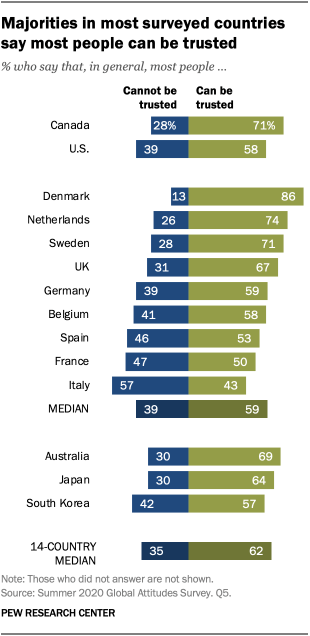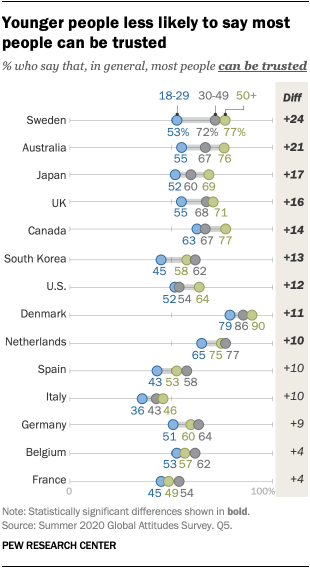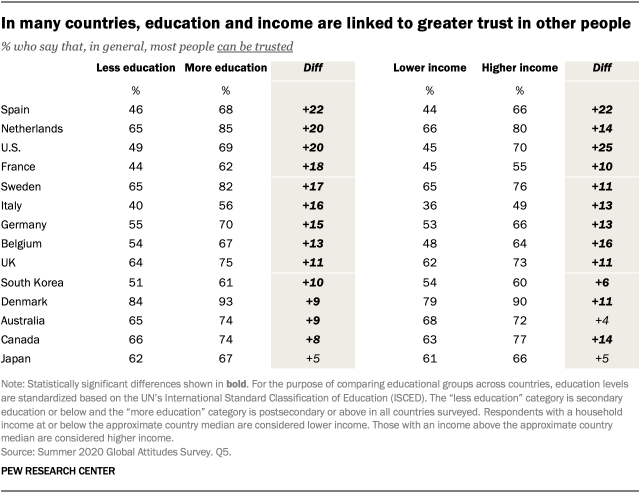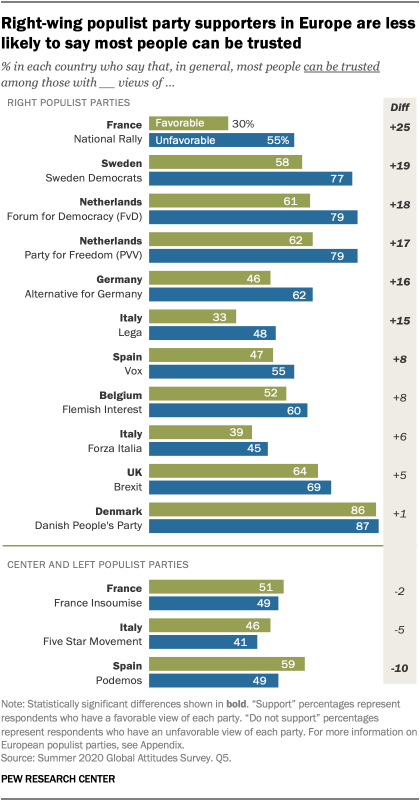
Trust in other people is relatively high in 14 advanced economies surveyed by Pew Research Center this past summer. But while a median of 62% of adults across these countries generally believe most people can be trusted, there are significant differences in these views by age, education and other factors, according to a new analysis of findings from the survey.
This analysis examines social trust in 14 advanced economies. Pew Research Center has long tracked views on trust in the United States, but this analysis marks the first time we have explored social trust across multiple countries.
The analysis relies on data from nationally representative surveys of 14,276 adults conducted from June 10 to Aug. 3, 2020. All surveys were conducted over the phone with adults in the U.S., Canada, Belgium, Denmark, France, Germany, Italy, the Netherlands, Spain, Sweden, the UK, Australia, Japan and South Korea.
The study was conducted in countries where nationally representative telephone surveys are feasible. Due to the coronavirus outbreak, face-to-face interviewing is not currently possible in many parts of the world.
Here are the questions used for this report, along with responses, and its methodology.
Overall, personal trust is highest in Denmark, where 86% say most people can generally be trusted. Majorities in 10 other countries agree, including about seven-in-ten or more in the Netherlands, Canada, Sweden, Australia and the UK.
People are more divided in Spain and France, where 53% and 50%, respectively, say most other people can be trusted. The only country where fewer than half of respondents say most people are trustworthy is Italy, where 43% hold that opinion.
Research has shown that personal trust in the U.S. is linked to broader confidence in democratic institutions, greater communal participation and fewer reported negative feelings like anxiety and depression.
In the United States, younger adults are less trusting of other people than their older counterparts, according to previous findings from the Center. The new study finds that the same pattern holds across many other advanced economies.
In most of the countries surveyed, younger people are significantly less likely than older people to say that others can be trusted. The divide is most pronounced in Sweden, where 53% of adults under 30 trust other people, compared with 77% of those ages 50 and up. There also are significant gaps between younger and older people in Australia, Japan, the UK, Canada, South Korea, the U.S., Denmark and the Netherlands.
In a few countries, those ages 18 to 29 are about as likely as those 50 and older to say most people can be trusted. In France, for example, 45% of younger people hold this opinion, compared with 49% of older people.
In the U.S., research on how this age gap changes over time is contentious. Some researchers posit that it may be due to differences between generational cohorts, while other research finds that individuals may become more trusting as they age.
Meanwhile, in every country surveyed but Japan, trust is lower among people with less education than among those with more education. In 10 of the 14 countries, this education gap is at least 10 percentage points.
The gap is widest in Spain, at 22 percentage points. The divide is also large in the U.S. and Netherlands (20 percentage points). In Japan, people are about equally likely to trust others, regardless of their level of educational attainment.
In 12 of 14 countries, people with incomes at or below their national median are less likely than those with higher incomes to say most people can be trusted. The U.S. stands out with the largest gap at 25 percentage points, followed by Spain (22 points) and Belgium (16 points). Again, Japanese people of all income levels are about equally likely to say most people can be trusted. The same is true in Australia.
Differences in social trust also emerge when looking at respondents’ political party preferences.
For example, Europeans with favorable views of right-wing populist parties are less likely to say most people can be trusted. In France, just three-in-ten supporters of the National Rally party say people can be trusted, compared with 55% of those with an unfavorable opinion of the party. In the Netherlands, supporters of two populist parties, Party for Freedom (PVV) and the Forum for Democracy (FvD), are also less likely to say most people can be trusted.
Still, this trend does not hold for all right-wing European populist parties. For example, there are no significant differences in social trust between those with favorable and unfavorable opinions of the Forza Italia in Italy, the Brexit Party in the UK, and the Danish People’s Party in Denmark. And supporters of the Spanish left-wing populist party Podemos are more likely to say most people can be trusted.
In the U.S., the survey finds no significant differences between Republicans and Republican-leaning independents (59%) and Democrats and Democratic-leaning independents (61%).
Note: Here are the questions used for this report, along with responses, and its methodology.




